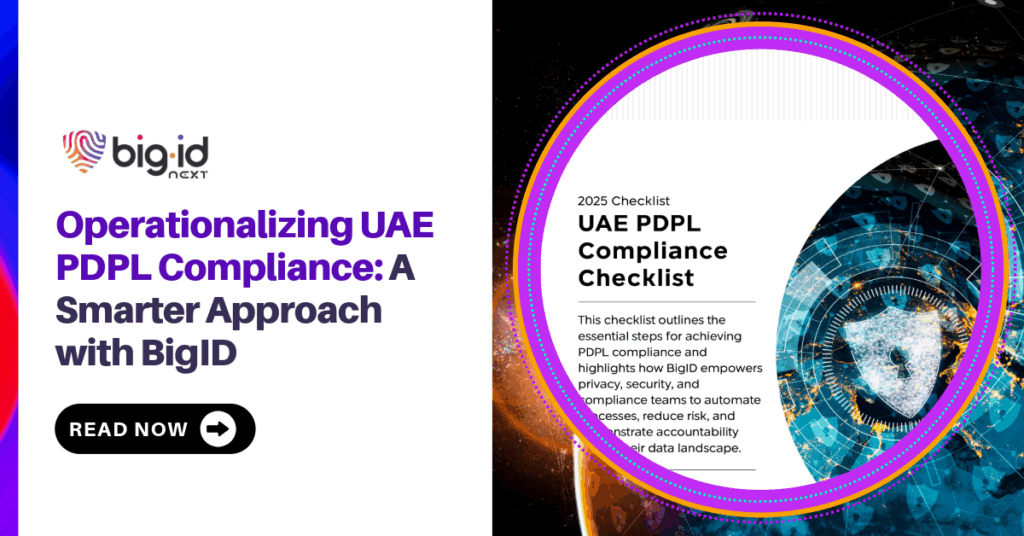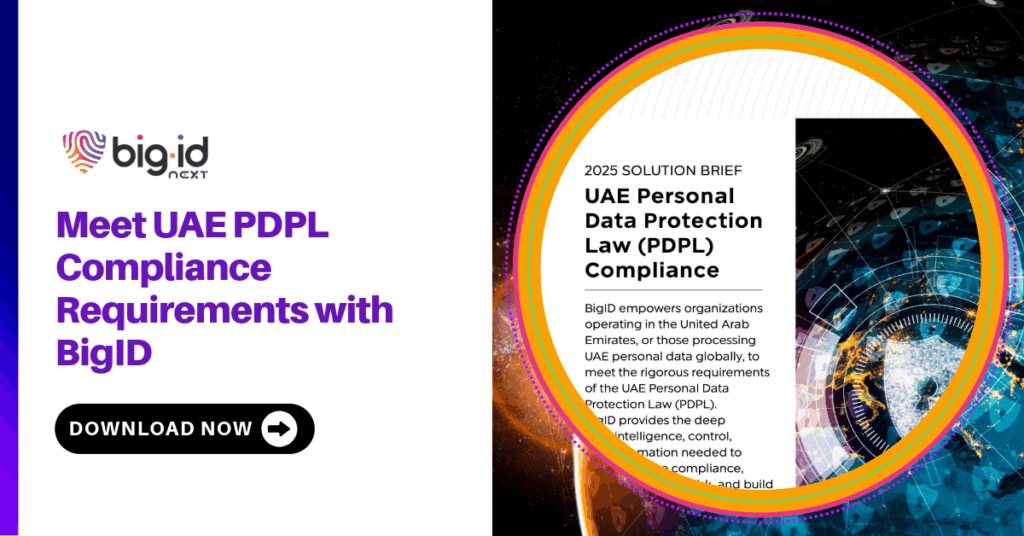Die Datenschutzgesetz der Vereinigten Arabischen Emirate (PDPL) Das PDPL ist das erste umfassende Bundesgesetz des Landes zum Schutz personenbezogener Daten und zur Wahrung des individuellen Datenschutzrechts. Es wurde als Teil einer umfassenderen Initiative zur Modernisierung der Rechtslandschaft der VAE eingeführt und spiegelt die strategische Vision des Landes wider, eine dynamische digitale Wirtschaft zu fördern und sich als globales Zentrum für Innovation und Handel zu positionieren.
Was ist die PDPL der VAE?
Die PDPL der VAE, Bundesgesetzdekret Nr. 45 von 2021Das Gesetz wurde am 29. November 2021 verabschiedet und schuf den ersten umfassenden Datenschutzrahmen der VAE. Es trat am 2. Januar 2022 in Kraft und wurde im Januar 2023 vollstreckbar. Das PDPL der VAE orientiert sich eng an internationalen Standards wie dem Datenschutz-Grundverordnung (DSGVO), der globale Maßstab für Datenschutz und -sicherheit.
Hauptziele des PDPL der VAE
Die Hauptziele des PDPL sind der Schutz personenbezogener Daten von Personen in den VAE, die Wahrung ihrer Datenschutzrechte sowie die Regelung der Erhebung, Nutzung, Speicherung und Übermittlung dieser Daten. Durch die Festlegung klarer Verantwortlichkeiten für Organisationen, die personenbezogene Daten verarbeiten, fördert das Gesetz eine sichere und transparente Umgebung für das Datenmanagement.
Das PDPL gilt sowohl für Datenverantwortliche und -verarbeiter in den VAE als auch für diejenigen außerhalb des Landes, die personenbezogene Daten von Einwohnern der VAE verarbeiten. Diese extraterritoriale Reichweite stellt sicher, dass jedes Unternehmen, das Daten von Personen in den VAE verarbeitet, unabhängig von seinem Standort, den gesetzlichen Anforderungen unterliegt.
PDPL-Konformitätsanforderungen der VAE
Das PDPL legt Grundsätze und Verpflichtungen fest, die denen globaler Datenschutzbestimmungen ähneln, allerdings mit einigen regionalen Besonderheiten. Zu den wichtigsten Compliance-Anforderungen gehören:
Rechtsgrundlage der Verarbeitung
Organisationen müssen eine Rechtsgrundlage für die Verarbeitung personenbezogener Daten ermitteln und dokumentieren, beispielsweise Einwilligung, vertragliche Notwendigkeit, rechtliche Verpflichtung oder berechtigtes Interesse.
Verwaltung von Einwilligungen
Wo eine Einwilligung erforderlich ist, muss diese freiwillig, spezifisch, informiert und eindeutig erfolgen. Unternehmen müssen Einwilligungen verfolgen und verwalten und Mechanismen für den Rückzug bereitzustellen.
Transparenz- und Datenschutzhinweise
Betroffene Personen müssen durch klare und zugängliche Datenschutzhinweise darüber informiert werden, wie ihre personenbezogenen Daten erhoben, verwendet und weitergegeben werden.
Rechte der betroffenen Personen
Einzelpersonen haben die Recht auf Auskunft, Berichtigung, Löschung, Einschränkung und Widersprucht zur Verarbeitung ihrer personenbezogenen Daten. Unternehmen müssen Mechanismen implementieren, um auf diese Anfragen innerhalb festgelegter Zeitrahmen zu reagieren.
Datenminimierung & Zweckbindung
Organisationen sind verpflichtet, nur die Daten zu erfassen, die für bestimmte, rechtmäßige Zwecke erforderlich sind, und sie nur so lange aufzubewahren, wie es zur Erfüllung dieses Zwecks erforderlich ist.
Datengenauigkeit
Personenbezogene Daten müssen korrekt und aktuell sein. Ungenaue oder veraltete Daten müssen berichtigt oder gelöscht werden.
Datensicherheit
Organisationen müssen geeignete technische und organisatorische Maßnahmen ergreifen, um Daten vor unbefugter Zugriff, Verlust oder Offenlegung. Dazu gehören Verschlüsselung, Zugriffskontrollen und Protokolle zur Erkennung von Sicherheitsverletzungen.
Benachrichtigung über Verstöße
Im Falle einer Verletzung des Schutzes personenbezogener Daten müssen betroffene Organisationen die Datenbüro der VAE umgehend und gegebenenfalls auch zur Benachrichtigung der betroffenen Personen.
Grenzüberschreitende Datenübertragungen
Personenbezogene Daten dürfen nur dann außerhalb der VAE übermittelt werden, wenn das Zielland einen angemessenen Schutz bietet oder wenn Sicherheitsvorkehrungen wie etwa vertragliche Klauseln vorhanden sind.
Datenschutzbeauftragter (DSB)
Die Ernennung eines Datenschutzbeauftragten ist für Organisationen erforderlich, die sensible personenbezogene Daten mit hohem Risiko oder in großem Umfang verarbeiten. Der Datenschutzbeauftragte überwacht die Einhaltung der Vorschriften und fungiert als Verbindungsperson zum Datenschutzbüro der VAE.
Verantwortlichkeit und Dokumentation
Organisationen müssen die Einhaltung der Vorschriften nachweisen durch Verzeichnis von Verarbeitungstätigkeiten, interne Richtlinien, Risikobewertungen und Schulungsprogramme.
Pflichten des Datenverarbeiters
Auftragsverarbeiter dürfen nur auf Anweisung des Verantwortlichen handeln und geeignete Sicherheitsmaßnahmen zum Schutz personenbezogener Daten ergreifen. Die Verantwortlichkeiten des Auftragsverarbeiters müssen in Verträgen klar definiert sein.
Wie können Unternehmen die Einhaltung des Personal Data Protection Law (PDPL) der VAE erreichen?
Um die PDPL der VAE einzuhalten, müssen Unternehmen einen strategischen und strukturierten Ansatz zum Datenschutz verfolgen, der sich auf Transparenz, Verantwortlichkeit und Sicherheit während des gesamten Datenlebenszyklus konzentriert.
So geht's:
1. Führen Sie ein umfassendes Datenaudit durch
Identifizieren Sie zunächst alle personenbezogenen Daten, die Ihr Unternehmen erfasst, verarbeitet und speichert. Dazu gehört das Verständnis von Datentypen, Quellen, Verarbeitungsaktivitäten, Speicherorten und Übertragungsströmen. Ein klares Dateninventar bildet die Grundlage für Compliance und ermöglicht risikobasierte Entscheidungen.
2. Datenverwaltungsrichtlinien entwickeln und durchsetzen
Legen Sie klare, dokumentierte Richtlinien fest, die die Verarbeitung, Weitergabe, Speicherung und Sicherung personenbezogener Daten regeln. Stellen Sie sicher, dass diese Richtlinien die Rechtsgrundlagen für die Verarbeitung festlegen, die Einholung und Verwaltung von Einwilligungen beschreiben und unternehmensweit effektiv kommuniziert werden.
3. Implementieren Sie strenge Sicherheits- und Risikokontrollen
Robuste technische und organisatorische Maßnahmen sind unerlässlich. Dazu gehören Verschlüsselung, Zugriffskontrollen, Schwachstellenanalysen und Datenanonymisierung, sofern möglich. Überprüfen und aktualisieren Sie Ihre Sicherheitsprotokolle regelmäßig, um neuen Bedrohungen immer einen Schritt voraus zu sein.
4. Ernennung eines Datenschutzbeauftragten
Wenn Ihre Organisation große Mengen sensibler oder risikoreicher Daten verarbeitet, Die Ernennung eines Datenschutzbeauftragten ist obligatorischDer DSB überwacht die Einhaltung der Vorschriften, berät zu Datenschutzverpflichtungen und dient als Hauptansprechpartner für das Datenschutzbüro der VAE.
5. Rechte der betroffenen Person aktivieren und verwalten
Stellen Sie sicher, dass Mechanismen vorhanden sind, mit denen Einzelpersonen ihre Rechte gemäß dem PDPL ausüben können, z. B. Zugriff auf, Korrektur oder Löschung ihrer Daten. Schulen Sie Ihre Mitarbeiter darin, solche Anfragen innerhalb der vorgeschriebenen Fristen zu erkennen und zu beantworten.
6. Erstellen Sie einen Reaktionsplan für Sicherheitsverletzungen
Bereiten Sie sich auf potenzielle Datenschutzverletzungen vor, indem Sie eine dokumentierte KrisenreaktionsplanDies sollte Protokolle zur Erkennung, Eindämmung und Benachrichtigung des UAE Data Office und gegebenenfalls der betroffenen Personen umfassen. Führen Sie regelmäßig Übungen durch, um sicherzustellen, dass Ihr Team bereit ist.
7. Schutz grenzüberschreitender Datenübertragungen
Vor Übermittlung personenbezogener Daten außerhalb der VAEüberprüfen, ob das Zielland einen angemessenen Schutz bietet oder geeignete Garantien wie Standardvertragsklauseln implementiert. In manchen Fällen ist die Einholung ausdrückliche Zustimmung von betroffenen Personen können erforderlich sein.
Durch die proaktive Umsetzung dieser Schritte können Unternehmen die Einhaltung des PDPL sicherstellen, regulatorische Risiken reduzieren und ein starkes Engagement für den Datenschutz zeigen.
Wie BigID Ihnen hilft, die PDPL der VAE einzuhalten
BigID Bietet eine integrierte, automatisierte Plattform, die es Datenschutz-, Sicherheits- und Compliance-Teams ermöglicht, den vollen Umfang des Datenschutzgesetzes der VAE (PDPL) zu erfüllen. So unterstützt BigID Unternehmen bei der Umsetzung der Compliance:
Entdecken und klassifizieren Sie sensible Daten
Automatisch identifizieren und klassifizieren persönliche, sensible und besondere Kategorien von Daten in strukturierten und unstrukturierten Systemen, sowohl vor Ort als auch in der Cloud.
Verwalten Sie die Einwilligung und die Rechtsgrundlage für die Verarbeitung
Verfolgen und protokollieren Sie die Rechtsgrundlage für die Verarbeitung personenbezogener Daten (z. B. Einwilligung, Vertrag) und automatisieren Sie die Einwilligung mit Erfassungs-, Speicher- und Opt-out-Workflows.
Erfüllen Sie die Rechte betroffener Personen im großen Maßstab
Rationalisierung der Auskunftsersuchen betroffener Personen (DSARs) von der Aufnahme bis zur Löschung mit automatisierten End-to-End-Workflows und Löschvalidierung.
Automatisieren Sie Richtlinien zur Datenminimierung und Datenaufbewahrung
Datenminimierung anwenden, durchsetzen Selbstbehalt Zeitpläne und identifizieren und kennzeichnen zu lange aufbewahrte oder redundante Daten automatisch zur Löschung.
Grenzüberschreitende Datenübertragungen überwachen
Erhalten Sie Einblick in internationale Datenströme und erkennen Sie so Datenübertragungen in Rechtsräume außerhalb der VAE.
Optimieren Sie die Reaktion auf Sicherheitsverletzungen
Beschleunigen Sie Reaktion auf Verstöße mit Einblick in vertrauliche Daten, automatisierter Risikoerkennung, Minimierung der Auswirkungen von Verstößen und beschleunigter Reaktion auf Vorfälle.
Verbessern Sie die Datensicherheit
Minimieren Sie die Angriffsfläche durch die Anwendung datenbasierter Sicherheitskontrollen, um das Insider-Risiko zu reduzieren, das Prinzip der geringsten Privilegien sicherzustellen und Zero Trust durchsetzen.
Unterstützen Sie DPOs mit einheitlichen Dashboards und Berichten:
BigID unterstützt DPOs und Compliance-Teams mit zentralen Dashboards für den Compliance-Status und benutzerdefinierten Berichten für die PDPL-Anforderungen der VAE.
Demo buchen Melden Sie sich noch heute an, um zu sehen, wie BigID Ihren Weg zur PDPL-Konformität beschleunigt.


